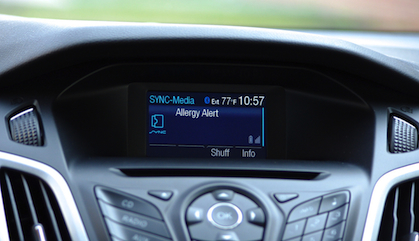 At the HIMSS13 event this week, an executive from the automaker Ford recapped the company's now well-documented vision for how to transform the car into a next generation platform for mobile health apps, devices, and services. For the first time, however, Gary Strumolo, Ford’s global manager for health and wellness, interiors and infotainment research and innovation, drew a line between his company and similar moves made by the competition.
At the HIMSS13 event this week, an executive from the automaker Ford recapped the company's now well-documented vision for how to transform the car into a next generation platform for mobile health apps, devices, and services. For the first time, however, Gary Strumolo, Ford’s global manager for health and wellness, interiors and infotainment research and innovation, drew a line between his company and similar moves made by the competition.
"To an extent we have pioneered this area of mobile health," Strumolo said in New Orleans this past week. "Others are starting in on infotainment [services in the car now]... but Toyota, for example, has a research project for a steering wheel that will do heart rate monitoring... they might have a galvanic skin response sensor for stress... and they are interested in doing this as well."
Strumolo said that Toyota "may do more in terms of alerting driver to their physical condition," and that Ford is "reluctant to do that" because it doesn't "think the sensors are necessarily good enough for that," he said. "We do want to use data but don’t want to say 'Pull over now because you are about to have a heart attack'." Strumolo said he doesn't believe the data collected would be able to determine that "with any level of certainty."
Ford now has 5 million cars on the road with its Sync technology embedded. This allows drivers and passengers to connect their smartphones to the car via Bluetooth and control apps via the car's built-in touchscreen or from the buttons on the car's steering wheel. Developers can tweak their apps to work for Sync by using Ford's AppLink API.
MobiHealthNews first reported on Ford's mobile health vision in May 2011 when we visited Ford's headquarters in Dearborn, Michigan along with a few dozen automotive trade industry press. At the time Strumolo explained -- as he did again at HIMSS this week -- that Ford has architected three ways for mobile health services to interact with its cars: Bluetooth connectivity between the car’s computer and personal medical devices, remote access to cloud services via the car’s computer, and syncing up to the health apps users already have on their smartphones. At HIMSS Strumolo shortened this to mobile health services can be "built-in, beamed in, or brought in".
Strumolo also discussed Ford's partnerships with Medtronic, WellDoc and IMS Health. Medtronic is working with Ford to show how a continuous glucose meter (CGM) that connected to the car via Bluetooth allows users to hear alerts about their blood glucose readings instead of having to fumble with their monitor’s screen while driving. Strumolo stressed how this could help ease the minds of drivers who have children with diabetes napping in the backseat. Ford is also working with WellDoc to connect its cloud-based DiabetesManager service, which could encourage drivers to double check their blood sugar right when they get behind the wheel if they had a low reading earlier that day. SDI or IMS Health has already launched its Pollen.com-powered Allergy Alert app for the iPhone that syncs up to Ford cars to keep drivers aware of allergy, flu and asthma alerts in the areas they are driving through.
Strumolo spent some time discussing the future of cars intelligently routing around areas with poor air quality, especially if the driver or a passenger has a health issue that makes them more sensitive to air pollutants.
"Smaller side streets have far less [air pollution]," Strumolo said. "You often don’t have to go too far to avoid it. Going through certain areas might be a better way to get around. Gary Indiana really smells and if you have breathing problems it might be a problem for you. It's not a big detour, but there is a simple way to get around it."
Strumolo also recapped Ford's joint partnership with Healthrageous and Microsoft to pull in coaching services from the wellness company's programs into the car. Microsoft is contributing access to its HealthVault PHR, help translating the data from the car-based sensors into the platform, and integration with its cloud offering Windows Azure.
Most mobile health app developers are creating apps for "0 miles per hour", Strumolo said. Developers need to always keep in mind the HMI, the human modified interface, and what "is relevant at 0 miles per hour" might not be "at 70 miles per hour", Strumolo said. "You can't have them lose focus on their primary task, which is driving safely."
Ford believes that this eventual push into mobile health in the car will help to redefine auto-safety. Today the automotive industry often thinks of auto-safety as crash-worthiness, Strumolo said. How well a car holds us in a serious crash. While that's important, he said that most people will never get into a serious car accident. Auto-safety should be about keeping the driver and passengers safer and healthier on a day-t0-day basis.
Citing Department of Transportation data, Strumolo said that Americans spend 500 million hours in their cars for their daily commutes each year. Within those many hours might be a window for a health check-up, according to Strumolo. Services like those offered by WellDoc, IMS Health, Medtronic, and Healthrageous might make that possible soon.
MobiHealthNews coverage of the HIMSS13 event in New Orleans is sponsored by AirStrip Technologies.














